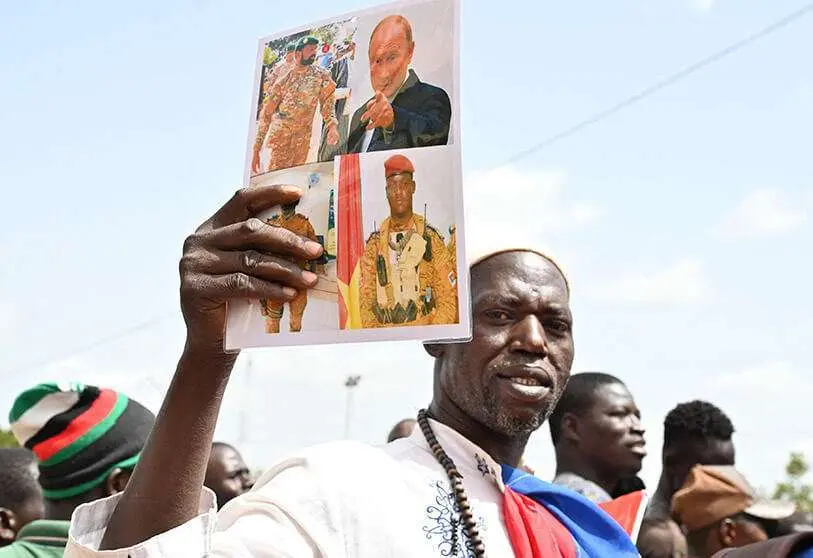Will France be replaced by Russia in Burkina Faso?

Burkina Faso has suffered its second military coup d'état this year, and the streets have seen Russian flags waving and anti-French slogans. The population is outraged by the lack of security in Burkina and many of them gathered in front of the French embassy to throw stones and set fire to it.
But the new coup d'état in Burkina Faso is not only due to the discontent of the population, but also to the division within the army. The elite "Cobras" unit deployed in the fight against the jihadists have reproached Lieutenant Colonel Damiba for not mobilising all forces on the ground.
In view of the impossibility of defeating jihadist terrorism in recent years, Captain Ibrahim Traoré, the new leader of Burkina Faso, has promised that the fight against terrorism will now be waged with partners other than France. Will Russia be one of the new partners? The population's intention is already confirmed by the Russian flags visible during the demonstrations in Ouagadougou.
It should be remembered that one in ten Burkinabe is displaced and more than 3 million are suffering from hunger, while terrorist attacks increased by 76% in the first half of 2022.
The effectiveness of the new Turkish Bayraktar TB2 drones, recently procured by the Burkinabe army but not deployed for long enough to analyse the perhaps positive impact on the fight against terrorism, is awaited.
Meanwhile Yevgeny Prigozhin, founder of the private Russian paramilitary group Wagner, announced on Tuesday that he supported the new head of Burkina's junta. Wagner has been present in Burkina for years, providing security for several mines and 200 mercenaries inside the country as part of former President Kabore's defence deal with Russia.
Obviously, if the Burkinabe authorities cannot fight jihadist terrorism on their own, they will have Wagner as a partner, as Mali and the Central African Republic have done, given the serious security situation in Burkina Faso, especially along the triple border.
However, the Wagner Group's support will have limited impact in the absence of a broader society-wide approach involving significant political reforms. While France's colonial record, like that of other powers in the region, can be criticised, blaming France for current jihadist advances, which led France to withdraw from Mali under junta pressure, will not be beneficial and reports suggest that the Wagner Group will be more brutal and less operationally effective than French counter-terrorism forces should Burkina Faso's military leaders request Wagner's assistance.
Despite ambitious statements by the new leadership in Ouagadougou, jihadists continue to advance across large swathes of Burkina Faso and Mali and into West African littoral states such as Togo and Benin. Al-Qaeda and Daesh affiliates only benefit from all the internal military and political disputes that engulf Burkina Faso and other countries in the region.
From a broader perspective, it seems that the different factions of Burkina Faso's military are increasingly busy competing with each other and blaming the other side (as well as France) for the military's failure to stop the jihadists. This distracts attention not only from the priority of regaining state control over their territory, but also from addressing critical governance and development challenges. The immediate result of the recent coup is a more fractured army and a more isolated Burkina Faso, both worrying developments for a region that is among the poorest in the world.
The problem for the population is that in the face of the insecurity in the country they demand responsibility from their own state, but also against the foreign forces that are supposed to protect them and do not do so. They mistakenly come to believe that these forces are therefore accomplices of the jihadists.
The US, for its part, has warned Burkina Faso's ruling junta of the risks of an alliance with Russia, whose Wagner paramilitary group has shown open support for the perpetrators of the latest coup in the sense that the countries where the Wagner group was deployed are weakened and less secure, and we have seen this in several cases in Africa.
If Burkina Faso's coup leaders associate themselves with the Wagner group, they know what it has done in Mali with disastrous consequences for civilians and for countering violent extremism. Wagner is not an anti-terrorist force.
This is the result of months where Russia has been exploiting social media and some activists to generate anti-French sentiment. But we have to remember that the longer the conflict in Ukraine goes on, the more vigilant we have to be on the African front. We cannot focus exclusively on the eastern flank and forget about the southern flank.
There is obviously a saturation of disinformation on social media due to external influences and Russian propaganda where it is in the interest of pro-Russian influencers to present the rivalry between France and Russia as the main division triggering the coup. We must not fall into this trap. This is in line with the narrative of a liberating, anti-colonial Russia.
It is too early to tell whether Burkina Faso will associate with Wagner and his mercenaries. For neighbouring Mali, on the other hand, it is already too late: Wagner's arrival in 2021 has triggered an explosion of abuses committed by the army against civilians, and with it increased the recruitment capacities of jihadist groups.

